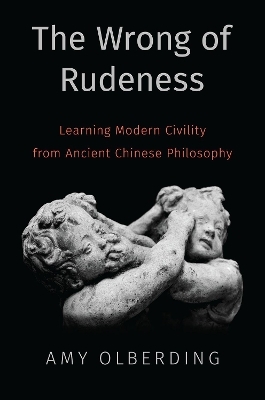
The Wrong of Rudeness
Learning Modern Civility from Ancient Chinese Philosophy
Seiten
2019
Oxford University Press Inc (Verlag)
978-0-19-088096-5 (ISBN)
Oxford University Press Inc (Verlag)
978-0-19-088096-5 (ISBN)
When so much of civic life is painful and fractious, why should we be polite? Drawing on the work of early Chinese philosophers who lived during great political turmoil but nonetheless avidly sought to "mind their manners," Amy Olberding explains why politeness still matters, and why it is essential to human life, due to our deeply social nature.
In a time of fractious politics, being rude can feel wickedly gratifying, while being polite can feel simple-minded or willfully naïve. Do manners and civility even matter now? Is it worthwhile to make the effort to be polite? When rudeness has become routine and commonplace, why bother? When so much of public and social life with others is painful and bitterly acrimonious, why should anyone be polite?
As Amy Olberding argues, civility and ordinary politeness are linked both to big values, such as respect and consideration, and to the fundamentally social nature of human beings. Being polite is not just a nicety--it has deep meaning. Olberding explores the often overwhelming temptations to incivility and rudeness, and the ways that they must and can be resisted. Drawing on the wisdom of early Chinese philosophers who lived through great political turmoil but nonetheless avidly sought to "mind their manners," the book articulates a way of thinking about politeness that is distinctively social. We can feel profoundly alienated from others, and others can sometimes be truly terrible, yet, as the Confucian philosophers encourage us to see, because we are social, neglecting the social and political courtesies comes at perilous cost.
The book considers not simply why civility and politeness are important, but how. It reveals how small insults can accumulate to damage social relations, how separating people into tribes undermines our better interests, and how even bodily and facial expressions can influence our lives with others. Many of us, in spite of our best efforts, are often tempted to be rude, and will find here tools for fighting that temptation.
In a time of fractious politics, being rude can feel wickedly gratifying, while being polite can feel simple-minded or willfully naïve. Do manners and civility even matter now? Is it worthwhile to make the effort to be polite? When rudeness has become routine and commonplace, why bother? When so much of public and social life with others is painful and bitterly acrimonious, why should anyone be polite?
As Amy Olberding argues, civility and ordinary politeness are linked both to big values, such as respect and consideration, and to the fundamentally social nature of human beings. Being polite is not just a nicety--it has deep meaning. Olberding explores the often overwhelming temptations to incivility and rudeness, and the ways that they must and can be resisted. Drawing on the wisdom of early Chinese philosophers who lived through great political turmoil but nonetheless avidly sought to "mind their manners," the book articulates a way of thinking about politeness that is distinctively social. We can feel profoundly alienated from others, and others can sometimes be truly terrible, yet, as the Confucian philosophers encourage us to see, because we are social, neglecting the social and political courtesies comes at perilous cost.
The book considers not simply why civility and politeness are important, but how. It reveals how small insults can accumulate to damage social relations, how separating people into tribes undermines our better interests, and how even bodily and facial expressions can influence our lives with others. Many of us, in spite of our best efforts, are often tempted to be rude, and will find here tools for fighting that temptation.
Amy Olberding is Presidential Professor of Philosophy at the University of Oklahoma. Her work focuses on early Chinese ethics. She is the author of Moral Exemplars in the Analects (Routledge, 2011), several academic journal articles, and she has also published work with Aeon, The Forum, and The Chronicle of Higher Education. When not studying and teaching philosophy, she farms.
Foreword
Chapter 1: Introduction
Chapter 2: Temptations to Incivility
Chapter 3: Temptations to Rudeness
Chapter 4: The Big Values
Chapter 5: Living the Big Values
Chapter 6: Rules, Rules, Rules
Chapter 7: Managing the Face
Chapter 8: Righteous Incivility Revisited
Chapter 9: Disappointments and Consolation
Works Cited
Endnotes
| Erscheinungsdatum | 20.07.2019 |
|---|---|
| Verlagsort | New York |
| Sprache | englisch |
| Maße | 211 x 145 mm |
| Gewicht | 318 g |
| Themenwelt | Geisteswissenschaften ► Philosophie ► Ethik |
| Geisteswissenschaften ► Philosophie ► Geschichte der Philosophie | |
| Geisteswissenschaften ► Philosophie ► Östliche Philosophie | |
| Geisteswissenschaften ► Philosophie ► Philosophie der Neuzeit | |
| ISBN-10 | 0-19-088096-1 / 0190880961 |
| ISBN-13 | 978-0-19-088096-5 / 9780190880965 |
| Zustand | Neuware |
| Haben Sie eine Frage zum Produkt? |
Mehr entdecken
aus dem Bereich
aus dem Bereich


